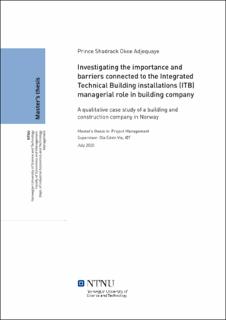| dc.description.abstract | Abstract
The production of functional buildings has currently been a demanding requirement for building companies and builders who invest a significant amount of money into building structures and want to gain competitive advantages in the building industry. It appears that some building companies are not able to meet the increasing demands of builders and regulators who request for sustainable, error-free, and environmentally friendly buildings. The root cause of this problem is related to the absence of technical program managers who ensure holistic-thinking and provision of integrated technology solutions to produce functional and cost-effective buildings; this is where the role of an Integrated Technology Building installations (ITB) manager is needed. The ITB manager serves a focal point that coordinates the activities of the individual technical disciplines to ensure smooth simultaneous operations of the integrated technical systems.
The purpose of this thesis is to investigate the application of ITB role in building projects. The objectives are to discover some challenges influencing the deployment of ITB roles and to investigate the extent to which the ITB role is beneficial to the building industry. These objectives are achieved by providing answers to the main research question “How does a construction company like Rambøl perceive the ITB role”. To answer this question, a descriptive, explorative, and explanatory case study of a single organization was conducted by performing eight (8) semi-structured interviews with employees from the project management, technical and engineering departments of Rambøl. The literature review involved the evaluation of pieces of literature that describe the challenges and benefits of using ITB role in projects.
In Rambøl, the ITB role is found to be very important to building projects considering the increasing number of building’s technical systems and their related characteristics (building’s complexity). The implications of the systems’ interdependencies require the need for multidisciplinary technical coordination to guarantee the delivery of functional and sustainable buildings. Per the findings, the lack of contractual authority and the late involvement of ITB managers in projects are some of the pressing challenges affecting the ITB role. The findings recommend the amendment of the general contract standard (NS 8407) to include the ITB roles and mandates. Besides, it recommends the involvement of ITB managers throughout the project's development lifecycle to perform cost-effective and efficient work. The resolution of these challenges and other relating challenges is assumed to improve the effectiveness of the ITB role in the building industry. Based on the information received from Ramøl, it can be assumed that the ITB concept is the future for the building industry. | |
